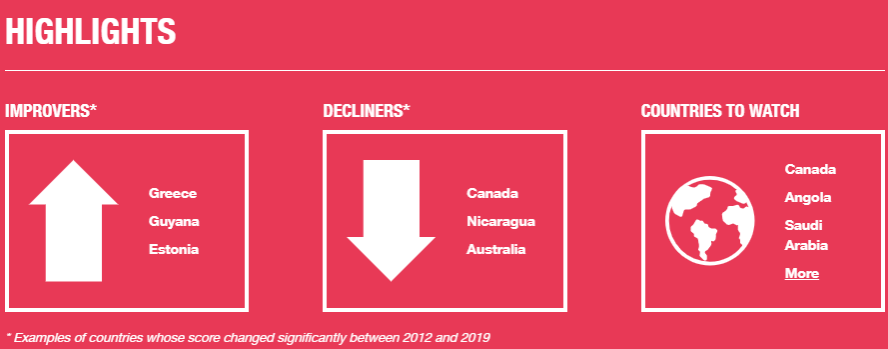Reem Zaia
Avocate
Article
5
There is no easy way to state it: Canada did not shine on anti-corruption matters in 2019, dropping 3 spots in Transparency International's annual rankings. While the lack of enforcement of corruption in Canada was seen as a leading factor in this drop, Canada has tackled corruption and money laundering by announcing in early 2020 consultations across the country aimed at eventually bringing in legislation aimed at strengthening corporate transparency across the country to fight money laundering, terrorist financing and tax evasion.
These efforts are particularly crucial in light of the predictions made on the health of the global economy related to the impact of COVID-19. With some reporting that Canada is on the brink of a recession as a result of the virus, anti-corruption measures become more crucial than ever. In 2018, a Global Economic Crime Survey reported an increase in economic crime, with 55% of Canadian respondents experiencing an instance of crime within the last 24 months. The same survey reported that fraud tends to rise in times of economic turmoil, which renders it critical for companies to address their "blind spots". With economic crime on the rise, implementing fraud prevention and detection measures that are up-to-date and which address the effects of this pandemic should be top-of-mind.
Canada drops ranks in Transparency International's listing
In late January 2020, Transparency International ("TI") released its annual Corruption Perceptions Index and one of the big developments was Canada's falling from its coveted position within the top 10 of least corrupt countries in the world.
Indeed, Canada slipped four points in one year (2018 to 2019) to the number 12 position with a score of 77/100. This position leaves Canada trailing behind peers like Germany, the Netherlands, and Norway, though it is still at the top in the Americas (the US ranked 23rd and Mexico ranked 130th out of 180 countries).

(Source: Transparency International, Corruption Perceptions Index 2019, online: https://www.transparency.org/cpi2019)
TI also listed Canada as a "country to watch", due to its assessment that corruption in Canada is consistently subject to low enforcement. It its press release, TI was quoted as saying: "while on a day to day level, Canadians do not face the same demands for bribes as so many citizens of countries that fair much worse on the CPI Index, […] 2019 rattled the image of Canada as a squeaky clean country".
Indeed, Canada has increased its international corruption notoriety in 2019 with the release of two separate government-commissioned reports on money laundering which detailed the extent of the problem in real estate, vehicles, and luxury goods in British Columbia. Referred to as the "Vancouver Model" of money laundering, the model uses casino gambling as a way for foreign and domestic criminals to launder illegitimate funds.
In addition, with deferred prosecution agreements becoming a reality for companies in Canada facing corruption allegations in 2019, the decision to prosecute – rather than proceed with negotiation of a remediation agreement – an important Canadian construction company with significant international operations remained in the headlines through much of 2019 and caused political challenges within the highest levels of government.
While overall this wasn't a "good" year for Canada, there may be an unseen benefit to TI's report after all: it is hoped that Canada's 2019 ranking, which is at an all-time low, may prompt federal and provincial governments and law enforcement to take a closer look at investigations and the prosecution of corruption crimes in Canada and to make these a priority once again.
CECI NE CONSTITUE PAS UN AVIS JURIDIQUE. L'information qui est présentée dans le site Web sous quelque forme que ce soit est fournie à titre informatif uniquement. Elle ne constitue pas un avis juridique et ne devrait pas être interprétée comme tel. Aucun utilisateur ne devrait prendre ou négliger de prendre des décisions en se fiant uniquement à ces renseignements, ni ignorer les conseils juridiques d'un professionnel ou tarder à consulter un professionnel sur la base de ce qu'il a lu dans ce site Web. Les professionnels de Gowling WLG seront heureux de discuter avec l'utilisateur des différentes options possibles concernant certaines questions juridiques précises.